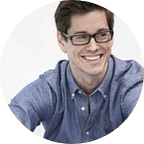Week 17, 2019
Brave New Work, Part 1: Complexity Conscious, Bureaucratic Debt, and Continous Experimentation
Each week: three ideas for how to make work better. This week: three ideas from Aaron Dignan’s Brave New Work.
Let’s dig right in.
1. Complexity Conscious
What do we mean when we say that something is “complex”? And how is that different from something that is “complicated”? Contrary to what most people think, these are two distinct concepts. Engines are complicated in that they have lots of moving parts. But the parts (and their relationships to one another) can be readily observed. Traffic, on the other hand, is complex. It too has many parts. The difference is that (most) of these parts cannot be seen. That’s what we mean when we say that organizations are complex adaptive systems: they contain relationships in which cause and effect are hidden from view. And to make matters worse, those relationships change (adapt) over time. We live in a VUCA world (see w22019) and increasingly so; complexity is on an exponential growth trajectory. And so to operate in this environment, we must embrace uncertainty and change how we make decisions.
For more on decision-making in a complex world, see w452018 for three steps to better decision-making.
2. Bureaucratic Debt
Gary Hamel is one of the world’s most influential business thinkers. And he’s declared an all-out war on bureaucracy. Specifically, he’s at war with “Organizational Debt” — his term for the hidden costs that bureaucracy creates. Financial Debt is serious business. And Hamel wants you to know that Organisational Debt is too. He’s got the numbers to prove it. According to his research, 50% of US management jobs (12.5 million positions) provide little to no value. And he’s estimated that US workers spend 350 million hours each week on unnecessary compliance issues. The cost is astronomical. Hamel’s work focus on US managers and US workers. But there’s little to think the rest of the world is better off. And so if we extrapolate the above numbers to the world as a whole, which Hamel has done, we arrive at an estimated yearly cost of $5.4 trillion. That’s how much we loose to bureaucracy. And until now, we didn’t even know it.
For more on this topic, have a listen to Episode 23 of the Leadermorphosis podcast: Gary Hamel on Busting Bureaucracy for Good.
3. Continous Experimentation
Complexity is on the rise and our organizations are bogged down in bureaucracy. The path we’re on is unsustainable and something has to give. So what’s next? How do we transform and adapt ourselves to this new reality? Dignan offers no silver bullets. And indeed he should not. Because as he explains, “complex problems cannot be solved, only managed.” But one thing is clear and that is that experimentation is key. When you don’t know what the future holds, the only viable path forward is small incremental steps. We must build, measure, and learn; we must define target conditions and iterate ourselves towards our goals. And if that sounds familiar to you it’s because it should! It’s a principle found in Lean, Agile, and Strategic Design. The trick now will be to apply this mindset to organizations as a whole! We must accept reality, stop trying to control the future, and start experimenting.
For more on how to run experiments, check out w282018 for three ideas on how to measure what really matters.
The world is changing and traditional organizations aren’t built to cope. They’re too rigid and, importantly, too slow-moving to keep up with the pace of change. To survive, they need to kill large-scale initiatives in favor of small rapid experimentation. They need a new mindset; they need to become Complexity Conscious.
But that’s not all. To thrive, these organizations must also be People Positive. And that is the topic for next week.
Until next time: Make it matter.
/Andreas
PS. Dignan’s book is a great read. I highly recommend it. So much so, in fact, that I’ve bought copies for everyone in my management team. Get your copy at bravenewwork.com.
